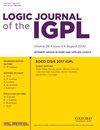A comparison of time series lags and non-lags in Spanish electricity price forecasting using data science models
IF 0.8
4区 数学
Q2 LOGIC
引用次数: 0
Abstract
Electricity is an indicator that shows the progress of a civilization; it is a product that has greatly changed the way we think about the world. Electricity price forecasting became a fundamental task in all countries due to the deregulation of the electricity market in the 1990s. This work examines the effectiveness of using multiple variables for price prediction given the large number of factors that could influence the price of the electricity market. The tests were carried out over four periods using data from Spain and deep learning models. Two different attribute selection methods based on Pearson’s correlation coefficient have been used to improve the efficiency of the training process. The variables used as input to the different prediction models were chosen, considering those most commonly used previously in the literature. This study attempts to test whether using time series lags improves the non-use of lags. The results obtained have shown that lags improve the results compared to a previous work in which no lags were used.利用数据科学模型对西班牙电价预测中的时间序列滞后和非滞后进行比较
电力是一个显示文明进步的指标,它极大地改变了我们对世界的看法。由于 20 世纪 90 年代电力市场放松管制,电价预测成为所有国家的一项基本任务。鉴于可能影响电力市场价格的因素众多,这项工作研究了使用多个变量进行价格预测的有效性。使用西班牙的数据和深度学习模型对四个时期进行了测试。为了提高训练过程的效率,使用了基于皮尔逊相关系数的两种不同属性选择方法。在选择不同预测模型的输入变量时,考虑了以往文献中最常用的变量。本研究试图检验使用时间序列滞后是否能改善不使用滞后的情况。研究结果表明,与之前未使用滞后期的研究相比,滞后期改善了研究结果。
本文章由计算机程序翻译,如有差异,请以英文原文为准。
求助全文
约1分钟内获得全文
求助全文
来源期刊
CiteScore
2.60
自引率
10.00%
发文量
76
审稿时长
6-12 weeks
期刊介绍:
Logic Journal of the IGPL publishes papers in all areas of pure and applied logic, including pure logical systems, proof theory, model theory, recursion theory, type theory, nonclassical logics, nonmonotonic logic, numerical and uncertainty reasoning, logic and AI, foundations of logic programming, logic and computation, logic and language, and logic engineering.
Logic Journal of the IGPL is published under licence from Professor Dov Gabbay as owner of the journal.

 求助内容:
求助内容: 应助结果提醒方式:
应助结果提醒方式:


